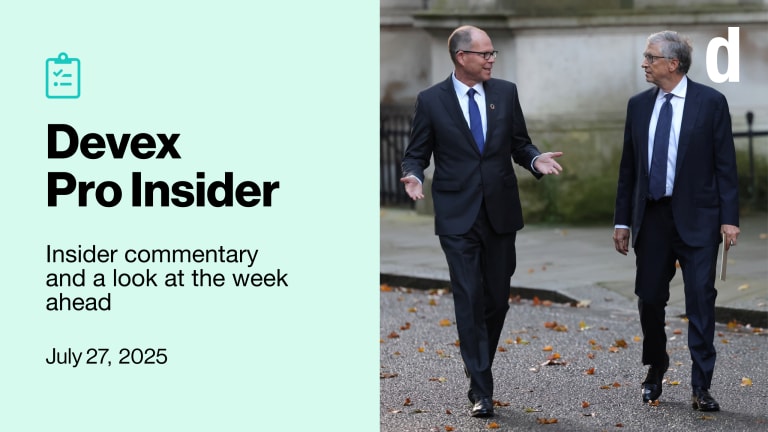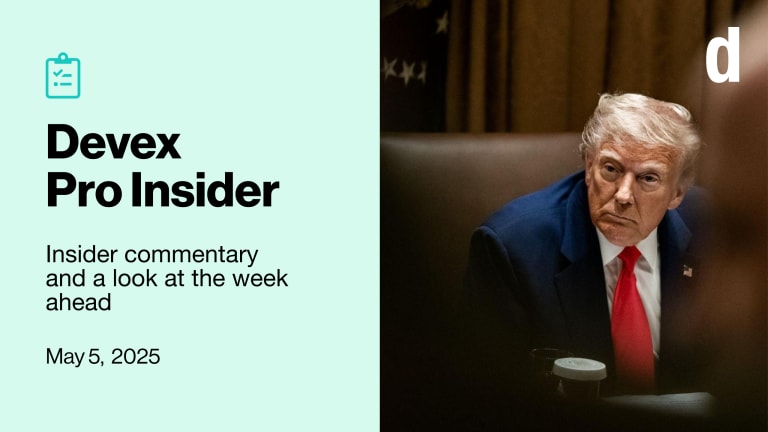Devex Pro Insider: Gates makes cuts; USAID finds reasons for cuts it already made
The reviews keep on coming for USAID partners; philanthropy has some ideas for change, albeit with caveats; and climate disbelief in the Amazon.
The U.S. foreign aid apparatus is being dismantled at breakneck speed — projects slashed, people fired, bills unpaid, courts stepping in, and even classified documents at one point headed for the shredder and burn bags. Meanwhile, nonprofits and U.N. agencies are facing what critics call ideological loyalty tests to qualify for funding. It's a crisis of accountability, survival, and the future of global aid — all unfolding in real time. The chaos deepened when USAID staffers were asked to review — postmortem — some of the nearly 10,000 canceled foreign aid awards. Their task? Retroactively justify terminations to match the numbers U.S. Secretary of State Marco Rubio wrote in a social media post on X. Programs were scored on a political loyalty scale — points for countering China or securing rare earth minerals, deductions for diversity, equity and inclusion, or DEI, and environmental justice. “Why should I make up a justification for why you've already terminated an award?” one USAID staffer told Devex. “I don’t know what your justification was, and I'm not going to do your work retroactively, backwards, to give you a reason.” Aid workers aren’t just battling bureaucracy — they’re fighting to keep food on tables, medicine in clinics, and communities from collapse. But can humanitarian work survive when politics takes the wheel? So if governments won’t fund aid, can philanthropy pick up the slack? Not quite. Donors have admitted the old playbook isn’t working, and nonprofits fear losing tax exemptions in an era of rising political scrutiny. The future? Community-led funding, fewer bureaucratic hoops, and a shift toward long-term investment over short-term Band-Aids. But with billions in government aid disappearing, will philanthropy be enough to fill the gap — or just another stopgap solution? Also in today’s edition: Climate cutbacks, Brazil cutting down trees to … save forests, a who’s who for Bellagio, and the State Department has unlocked funds for the National Endowment for Democracy. Bits and pieces Gates is scaling back Breakthrough Energy. The climate-focused group is making deep cuts, shutting down its U.S. policy team, European unit, and partnerships arm, according to The New York Times. With Republicans controlling Washington, Bill Gates is shifting focus from policy to funding clean energy startups through Breakthrough Energy Ventures. His commitment to climate remains, but the Trump era is reshaping his approach. CZI’s climate future unclear. Meta’s Mark Zuckerberg and his wife Priscilla Chan’s climate giving is also in flux. Despite the Zuckerbergs’ more than $200 billion fortune and a 99% giving pledge, CZI’s new climate lead, Alicia Seiger, says there’s no clear way to spend billions effectively, according to Inside Philanthropy. She’s centralizing CZI’s climate work but doesn’t have a set budget for 2025. With recent pullbacks in DEI and social advocacy, and Zuckerberg’s rightward shift, CZI’s future in climate philanthropy is still taking shape. You couldn’t make this stuff up. A “sustainable” highway through the Amazon? Brazil is plowing a four-lane road through protected rainforest to ease traffic for COP30 in Belém, according to BBC. Officials call it progress, touting wildlife crossings and solar lighting, but locals and conservationists see deforestation, lost livelihoods, and a fragmented ecosystem. Farmers have already lost income, and scientists warn that wildlife migration will be cut off. As world leaders gather to discuss saving the Amazon, this project may be doing the exact opposite. In good company. It’s a prestigious, somewhat daunting list to join — Supreme Court Justice Ruth Bader Ginsburg, former U.S. Secretary of State Henry Kissinger, author Maya Angelou, and former President of Ireland Mary Robinson. Oh, and 85 Nobel laureates. The Rockefeller Foundation’s Bellagio Center just announced that 105 leaders from 33 countries have been selected to join its Bellagio Center residency program’s 2025 class, and it officially opened a call for applications for 2026 residencies. Since its launch in 1959, the program has welcomed more than 4,100 “trailblazers, changemakers, and champions” from over 130 countries. In a statement, John Gans, vice president at the Rockefeller Foundation, told Devex that the foundation “has a long legacy of pioneering creative, science-based, and scalable investments to solve our world’s most intractable problems — and has worked with partners from across political lines, sectors, and national borders to do so.” End of an era. After 55 years, the Inter-American Foundation is effectively closed — website gone, staff on leave, and grants axed (except one). IAF helped communities in Latin America and the Caribbean build safer, stronger futures by tackling migration and violence while doubling every dollar invested. NED is back in action. After months of blocked funds, the State Department has finally unlocked $239 million for the National Endowment for Democracy — a big win for its mission. “A freer and more prosperous world strengthens American security, drives economic growth, and reinforces American global leadership,” said NED President Damon Wilson. With funding partially restored, NED can get back to supporting pro-democracy efforts in Cuba, Venezuela, Iran, China, Russia, and beyond. Moving on After six years of leadership, Don Gips will transition to CEO emeritus of the Skoll Foundation. Marla Blow, president and COO, will take over as CEO on June 1. The foundation, which celebrated its 25th anniversary last year, says it has supported more than 400 social entrepreneurs, invested over $1.2 billion worldwide, and amplified social innovation globally. M.A. Keifer Buckingham joins the Center for Global Equality as managing director on April 1, bringing expertise in LGBTQ+ inclusion in U.S. foreign policy. She announced the end of her tenure at the State Department's Bureau of Democracy, Human Rights, and Labor in February. Marilyn Blattner-Hoyle takes the reins at Swiss Re on April 1. A Swiss Re leader since 2021, she steps up from her role as global head of trade finance. She succeeds Veronica Scotti, who’s moving on after 25 years. Harriet Harman is the United Kingdom’s new special envoy for women and girls. A longtime champion for women’s rights, she’ll lead global efforts on reproductive health, education, and gender-based violence. The “job is far from done,” she said, vowing Britain will stand up for women and girls worldwide. U.K. Foreign Secretary David Lammy called her “a formidable advocate.” Amy Weaver has been appointed CEO of Direct Relief, effective May 5. She is currently president and CFO at Salesforce. Weaver succeeds Thomas Tighe, who led Direct Relief for 24 years. Weaver will build on the organization's 75-year legacy. Kristin M. Lord has completed her decade-long tenure as president and CEO of IREX. Under her leadership, IREX advanced its mission to foster prosperous and inclusive societies, affecting nearly 800 million people worldwide. The initiatives ranged from empowering youth and teachers to supporting civic leaders and strengthening institutions. After nearly four years of leadership as East Africa director at WomenLift Health, Dr. Norah Akong'o Obudho is moving on. Her impact helped expand the program’s reach from three to six countries, launching the first East Africa Regional Dialogues on allyship and equipping and empowering over 120 women leaders in the region. Agnes Dasewicz is the new chief investment officer at the Global Energy Alliance for People and Planet. Formerly with the U.S. DFC, USAID, and the International Finance Corporation, she knows what’s what in scaling investments in clean energy and tackling poverty. At GEAPP, she’ll drive the strategy to expand renewable energy access in underserved regions. Up next The Raisina Dialogue 2025 in New Delhi. India’s flagship geopolitical and geoeconomic conference brings together world leaders, policymakers, and experts to tackle global challenges and foster cooperation. Hosted by the Observer Research Foundation and India’s Ministry of External Affairs, it’s a must-watch forum for shaping the future. March 17-19. A key UHC summit in Nairobi. In this two-day conference, the government and VSO will bring together policymakers, health care professionals, civil society, and private sector leaders from East Africa to push for equitable health care. March 18-19.
The U.S. foreign aid apparatus is being dismantled at breakneck speed — projects slashed, people fired, bills unpaid, courts stepping in, and even classified documents at one point headed for the shredder and burn bags.
Meanwhile, nonprofits and U.N. agencies are facing what critics call ideological loyalty tests to qualify for funding. It's a crisis of accountability, survival, and the future of global aid — all unfolding in real time.
The chaos deepened when USAID staffers were asked to review — postmortem — some of the nearly 10,000 canceled foreign aid awards. Their task? Retroactively justify terminations to match the numbers U.S. Secretary of State Marco Rubio wrote in a social media post on X. Programs were scored on a political loyalty scale — points for countering China or securing rare earth minerals, deductions for diversity, equity and inclusion, or DEI, and environmental justice. “Why should I make up a justification for why you've already terminated an award?” one USAID staffer told Devex. “I don’t know what your justification was, and I'm not going to do your work retroactively, backwards, to give you a reason.”
This story is forDevex Promembers
Unlock this story now with a 15-day free trial of Devex Pro.
With a Devex Pro subscription you'll get access to deeper analysis and exclusive insights from our reporters and analysts.
Start my free trialRequest a group subscription Printing articles to share with others is a breach of our terms and conditions and copyright policy. Please use the sharing options on the left side of the article. Devex Pro members may share up to 10 articles per month using the Pro share tool ( ).
Helen is an award-winning journalist and Senior Editor at Devex, where she edits coverage on global development in the Americas. Based in Colombia, she previously covered war, politics, financial markets, and general news for Reuters, where she headed the bureau, and for Bloomberg in Colombia and Argentina, where she witnessed the financial meltdown. She started her career in London as a reporter for Euromoney Publications before moving to Hong Kong to work for a daily newspaper.




